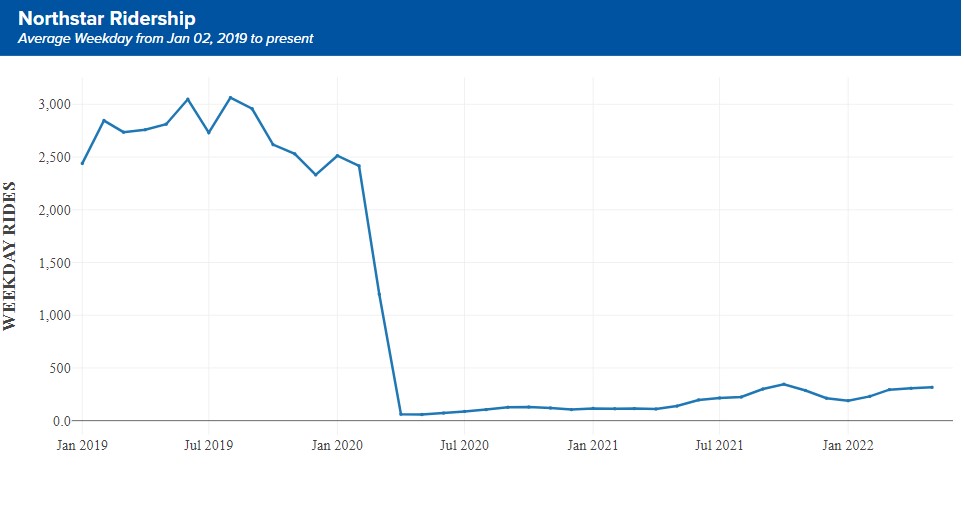Anoka County stands up to Met Council over Northstar train subsidies
A glance at Metro Transit’s chart below tells you all you need to know about the viability of the failing Northstar commuter rail line.

While ridership never met expectations, it plummeted during the pandemic, falling off as much as 95 percent. Last year ridership totaled 150,000, a far cry from the 767,00 passengers in 2019. Ridership continues to lag this year at slightly higher levels than 2021.
The dramatic decline in riders has led the Met Council to cut service to just four trains on weekdays, while eliminating service to Twins and Vikings games altogether. Despite the cutbacks, the cost to the three counties and state agency that subsidize Northstar remains as high as ever, roughly $15 million annually.
But Anoka County officials have put Metro Transit, an agency of the Met Council, on notice that they’re no longer just going along for the ride. They say cuts in service and ridership should come with a hefty cut in their subsidy, according to the Star Tribune.
Anoka County and Metro Transit can’t agree on who should pay to run the Northstar commuter rail line more than two years after the COVID-19 pandemic caused ridership to plummet.
The Anoka County Board has made what it calls its “full and final payment” to cover the county’s share of 2022 operating costs for Northstar, but Metro Transit says the $1.95 million check does not fulfill the county’s obligations.
Metro Transit insists Anoka County owes more than $4.5 million in taxpayer subsidies even for the streamlined service. Furthermore, the transit agency blames the failure to expand Northstar service this year on previous financial disputes with Anoka County.
But Metro Transit said it was not able to increase service levels this year because Anoka County withheld payments for the last six months of 2020 and all of 2021, according to agency spokesperson Drew Kerr. The county has since paid in full for both years.
The $1.95 million payment for 2022 “will not be sufficient to cover the county’s share of costs for current services,” Kerr said. “This means it will not be enough to pay for increases in services or the addition of event services, as we had hoped for in 2022.”
Yet the northern metro county refuses to budge or bargain after mounting a successful challenge last year.
Anoka County was supposed to have paid nearly $6 million to Metro Transit last year, but successfully reduced its bill to $1.95 million. Federal COVID relief funds and a rebate from the railroad track owner, BNSF, made up the difference. Though the county and Metro Transit agreed to the 2021 figure, there has been no signed agreement on this year’s payment.
“They are giving the same service in 2022, so we are paying the exact same amount that we gave them in 2021, even though they requested four times the amount,” said Anoka County Board Chair Scott Schulte at a June 28 board meeting. “Consider this our entire full and final payment for 2022.”
In the past Schulte has called for Northstar to be shut down in favor of other transit options. But for now, the ailing commuter line remains in limbo.
County Commissioner Matt Look said the County Board likely would not object to paying the full $4.6 million if Metro Transit had held up its part of the agreement to run four weekday trains each way.
“We have a highly underperforming asset, but we get the luxury of paying for it,” Look said. “We only have the responsibility of making sure that we pay for a contract and that the service we paid for was in fact rendered. We have to do what is best for our people and our taxpayers.”
Kerr said Metro Transit is hopeful differences can be resolved, and that payments the county recently made for 2020 and 2021 were an important start.